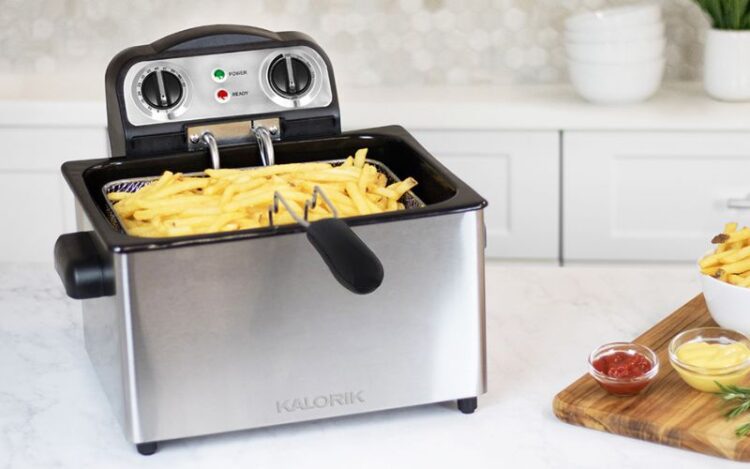The method of deep-frying food has been widely popular around the world for millennia. Immersion in heated oil creates a crispy and delicious outside while maintaining the tenderness of the interior of the dish. Dishes prepared with deep-frying have gained notoriety for their exceptional flavor and texture combinations. Deep-frying, like any other cooking method, needs regular TLC to get consistently delicious results every time. In this post, we’ll go into the realm of deep frying, discussing its advantages, what causes oil to stick in fryers, how to get rid of it, and how to avoid it from happening again.
Definition of Deep-Frying
Food is deep-fried by placing it in oil heated to between 175 and 190 degrees Celsius (between 350 and 375 degrees Fahrenheit). Deep-frying provides a crispy exterior layer, or “crust,” because to the quick heat transmission, and it also helps to seal in the food’s natural juices. Deep-frying can make just about anything delicious, from doughnuts and spring rolls to French fries and chicken wings.
Benefits of Deep-Frying with Oil:
The numerous culinary benefits of deep-frying in oil are a major factor in the technique’s widespread popularity. Deep-frying uses high temperatures to immediately encapsulate the exterior of the food, trapping in moisture and tastes. Food prepared in such a short amount of time has a crisp outside and a juicy interior. Furthermore, deep-frying enables the preparation of a vast diversity of foods, from savory to sweet, guaranteeing that a wide variety of mouthwatering masterpieces can adorn the dinner table.
Causes of Sticky Oil in Deep Fryers: Understanding the Problems
Inadequate Waste Disposal Procedures:
The failure to regularly clean a deep fryer is a leading cause of gummy oil buildup in these appliances. Food particles, grease, and oil splatters can build up in the deep fryer if you don’t clean it after each usage. These leftovers can harden into a sticky film that reduces the efficiency of the fryer and taints the taste of future meals if not removed.
Poor or Outdated Cooking Oils Used:
Picking the wrong oil for cooking can greatly increase the likelihood of a buildup of sticky oil. Sticky residues can occur if you deep-fry with the wrong kind of oil or if you use oil that has been reused several times. Oil breakdown, leading to off-flavors and textures, can also be caused by overheating the oil or exposing it to pollutants.
How to Efficiently Drain the Oil from a Deep Fryer
Clean and Dry the Equipment Immediately after Use:
It’s important to clean the deep fryer as soon as it cools down after usage to avoid oil buildup that can be difficult to remove. Use a paper towel to absorb excess oil and scrape away any leftover food particles. Cleaning up spills as soon as possible helps avoid the residues hardening and making cleanup more of a chore.
Remove Excess Grease and Residue with a Paper Towel and Damp Rag:
A wet rag or paper towel can remove minor accumulation. Remove any oily remains from the deep fryer by wiping down its interior and exterior. This technique works well on minor stains and spills.
Degrease with Hot, Soapy Water and an Appropriate Dish Detergent:
More extensive cleaning is required to remove substantial sticky oil accumulation. Put some hot water and a little mild dish soap in the deep fryer. The sticky residues can be loosened by letting the mixture settle for a time. The next step is to scrub the inside surfaces with a soft brush or sponge, focusing on the spots with the most grime. Make sure there is no trace of soap left in the fryer by giving it a good rinsing with fresh water.
Preventing Sticky Oil Problems in the Future: Proactive Measures
Make Sure You Use the Right Oil When Deep Frying:
A crucial first step in avoiding oily residue is choosing the correct cooking oil. Choose oils like vegetable, canola, or peanut that have high smoke points so they don’t break down too quickly at the high temperatures needed for deep frying.
Conduct Frequent Checkups and Maintenance; Clean and/or Replace Filters and/or Greased Components
If you want your deep fryer to last and work well, regular maintenance is a must. Checking for wear and tear, cleaning and greasing of moving parts, and replacing filters should be regular maintenance tasks. This method ensures a safe and effective cooking space.
Empty and clean the unit on a regular basis when not in use:
The deep fryer should be emptied and cleaned on a regular basis even when it is not in use. Any remaining oil remnants won’t get sticky and be a pain to clean up thanks to this. A deep fryer that has been properly stored and cleaned will last for a long time.
Conclusion
Deep-frying is a method that can take simple items and turn them into something spectacular, and it has a prominent place in the realm of culinary creation. You can make sure your deep-frying endeavors are always successful and trouble-free if you know what causes sticky oil buildup in deep fryers and take preventative measures to clean and maintain them. The benefits of deep-frying with oil are varied, and with the correct care and attention, your deep fryer will continue to be a wonderful asset in your culinary ventures. Indulge in a world of flavors and sensations by mastering the art of deep-frying and keeping sticky oil at bay, and take your dining experiences to new heights.

